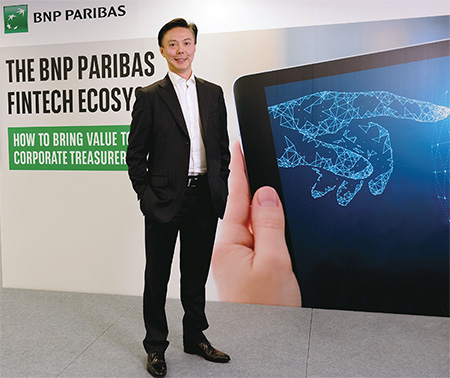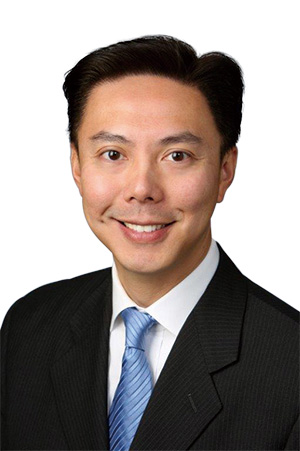Timothy Lee is Managing Director, Head of Transaction Banking Greater China, BNP Paribas and a member of the College's Business Career Development Advisory Committee. Here he talks about how he started in finance, the impact of Fintech, and the qualities he looks for in graduates seeking to enter the finance sector.
Interview by Eric Collins
How did you start out in finance?
Mine is one of those classic Hong Kong stories. I was born and raised in Hong Kong but due to the handover situation back in the 1980s, the family decided to emmigrate to the US. We moved to San Francisco and I spent about 11 years there going through middle school, high school and college.
After graduation I decided to come back to Hong Kong to take a look at where I grew up, and find my roots. This was coincidentally the time when the Hong Kong and China economy really started taking off. So, it was a fortunate time and I ended up looking for a job here and that's how I started my career in banking back in the early 1990s.
What was your first job in Hong Kong?
I landed a management trainee place with HSBC and that was going to be three years of accumulating experience in Asia and then back to the US, and it has ended up being 20 years plus in Hong Kong. My tenure kept getting extended as there were so many more opportunities here compared to back in the US.
Six years later you decided to move on from HSBC. Why?
All professionals – and students – need to keep abreast of the latest developments. The reason for the move to Citibank was that global cash management was being developed in Asia. A lot of banks started looking at the flow banking business. Cash management and trade finance were coming together as a core driver of the banking industry. I realised this could be an opportunity to learn something new.
You then moved to a US startup. What did you learn?
When you move into a very small company you realise that the decisions that you make every day will have an impact. You see things more from a management perspective. That also gives you an opportunity to reflect more on management practice. How do you motivate the team? With a very small firm you really see the critical value of being able to collaborate successfully.
What's your advice on working with startups?
Well the Hong Kong economy overall has changed quite a bit. It was largely supported by a number of small and medium enterprises that were mainly manufacturing driven but that's changed drastically. Nowadays when we say startups it's often about Fintech. So, for a student who has tech background, and is mobile from a career perspective, it would not be a bad place to start.
How is Fintech affecting employment opportunities?
The banking landscape is changing. I read an article last year in Harvard Business Review which said that 30% of all banking jobs may disappear because of the changing technology, social media, etc. But my view is that if 30% disappears, another 20% to 40% might be created. We will lose some job roles in client servicing or manual processes in back end operations, but then other jobs will be created because we need to utilise and facilitate the new technology.
How is Fintech changing the way banks work?
We need to keep reinventing ourselves, keep learning about what drivers are really changing the economies, bank corporates or personal clients. For example, in wealth management which is the asset management side of our business, relationship managers were once the key. Nowadays it's still about one-to-one relationship, how I serve my clients, but a lot of things are moving onto robotics. So, if a wealth management client is looking for an investment product, they will either contact us by phone or through an app. Robotics technology will be involved from the get-go. The robot can generate price quotes, place orders, do the settlements pretty much on a Straight Through Processing (STP) basis whereas before it was fairly manual. Now with so much application interface required, we need a lot of engineers or tech-savvy individuals.
Is blockchain making a difference to transaction banking?
I would carve transaction banking into two large segments, cash management and trade finance. Within trade finance last year the Hong Kong Monetary Authority launched a very important initiative, eTradeConnect, using blockchain. BNP Paribas is one of 12 participating banks and this is all about digitising the entire open account work flow. The eTradeConnect blockchain network has moved everything onto a digital platform where it's open and secure. This is the way that we will be moving ahead. Hong Kong is obviously one of many ecosystems trying to push for that. Others are in Singapore and in China, and once these ecosystems start converging, we'll see a big adoption of blockchain technology.
Timothy Lee and his colleagues in the Transaction Banking Team
How have you engaged with the College of Business so far?
I was at the career fair last September and it was good to meet the student population. I haven't had a chance to engage directly with the students in any mock interviews yet and that's something that I want to do and help prep a little bit.
What qualities do you look for in graduates entering the finance sector?
A lot of times graduates come in and focus purely on their academic results and what they've done. I've often told students that by the time they get to interview, all the CVs look pretty much the same to me. Our HR Department uses algorithms to pick up keywords or certain key patterns. Obviously, a lot of corporates also now go to social media to do some research on candidates as part of the process to try and to understand individuals better than just a couple pages of CV.
What I would look for is the individual's personality. I guess a lot of universities prep the students pretty well in terms of how to write a CV and these have become something of a commodity now. What we're trying to extract is the personality. How would you fit into our culture? How open-minded are you? Are you mobile? Do you want to learn? Can you collaborate? So, it's really the culture, the personality of the individual we’re looking for.
How do people from a US educational background compare to those from Hong Kong?
I do see a difference in my interaction with graduate trainees or going through the recruitment process as an interviewer. I would say that students coming from overseas have a more open mindset now, and maybe a more positive attitude saying: I want to try. It's an intangible quality that I see. I can't really say that's what open-minded means. It's through the conversation and through their own personal experience that I find they convey a bit more. Hong Kong students can convey more on their knowledge and views on what's going on outside Hong Kong.
What questions do you ask in interview?
Well, I might ask: Why are you interested in my firm? What do you know about what BNP Paribas does? What are you looking for in working with us? And I'm never looking for a correct answer. Then the second thing is to communicate about what they're interested in outside of banking, and outside of Hong Kong. So: Are you aware of what's going on globally? What are some of the key events happening now? When we talk digital: What are your interests in digital technology? I feel Hong Kong students can focus more to effectively communicate in an elaborated conversation.
"I'm never looking for a correct answer"
Is the willingness to travel overseas significant?
Absolutely, Hong Kong has always been a world city, it's very international. In my interviews I am always looking to hear a positive message on physical mobility from student candidates because I look after greater China.
Is lack of communication ability to do with Hong Kong's education system?
There's the pressure to conform and just to focus on getting through school to a get a diploma. What you're actually learning and the quality of your interactions with others during your school years may, I guess, be perceived as something that's not so valuable, whilst in fact it's really important. A lot of schools and universities in Hong Kong have prepped their students well, but they're pretty much model answers – and I'm not looking for that.
So, you are looking for the outlier?
Exactly. When I see something in the resume which is different, I tend to question. I want to drive my conversation through that to bring out the personality of the individual. I don't want pre-planned and very polished answers that I know students are taught. I'm trying to find out who a person is, and invite them to express themselves by diving into something different.
Timothy Lee
Managing Director
BNP Paribas



